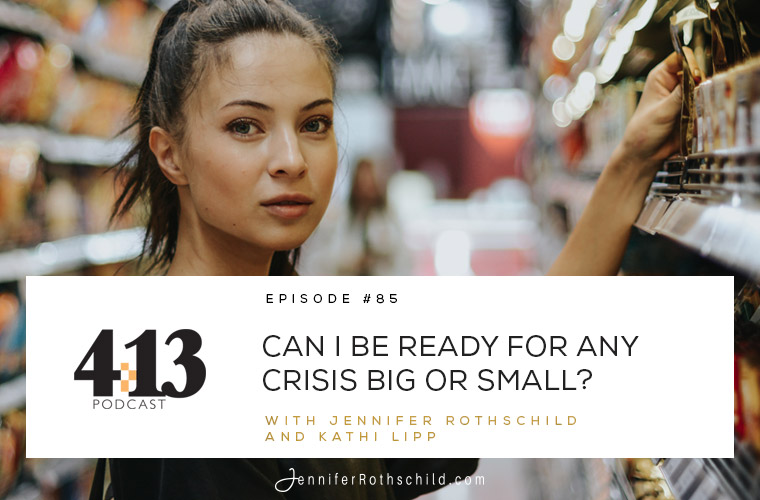
Oh, friend, crises happen to all of us, don’t they?
There’s the big stuff like the current coronavirus pandemic. It’s brought with it the kind of critical situation we’ve never seen or experienced before. But big stuff can also include natural disasters such as hurricanes and wildfires and earthquakes and floods.
There’s also the other hard stuff that may seem smaller, but when it’s happening to you, it’s still way big. Am I right? Things like sudden injury, losing your job, or even your computer crashing.
When a crisis comes, we don’t want to live in panic mode. Instead, we want to live prepared.
Today, on the 4:13 Podcast, you’ll learn how to do just that! Author Kathi Lipp is here, and you’re going to get five doable, simple steps to living proactive rather than reactive. She’ll help you prepare your mind, your heart, and your home for any unexpected situation.
Kathi is the author of 20 books, including her newest book, Ready for Anything: Preparing Your Heart and Home for Any Crisis Big or Small. She’s also the host of the Clutter Free Academy Podcast and the Clutter Free Facebook group, where thousands of women—and a few brave guys—support each other in living a clutter-free life.
Friend, you’ll love how practical and timely this episode is. So, get ready to gain some great info and lots of inspiration!
5 Ways You Can Be Prepared for Any Crisis
- Follow the 3-2-3 Principle. Kathi talks about the power of pre-deciding or choosing in advance how you’re going to react to a crisis. Pre-deciding is making decisions now that will take care of your future self. One helpful idea is the 3-2-3 Principle.
First, Kathi encourages that you have three days of “get-out-of town-if-you-need-to” supplies ready, such as clothes and food. Second, you have two weeks of food, water, and whatever else you’d need to shelter-in-place. Third, you have three months of expenses to cover the bare minimum you’d need to survive during that period.
When you plan in this way, you’re saying, “I don’t know what the crisis will be, but I’m choosing now how I’ll respond.” Putting those things aside helps prepare you for any crisis.
- Take an inventory of what you have. Kathi suggests that you see what you already have before you go shopping and points to the World War I motto that says, “Use It Up, Wear It Out, Make It Do, Or Do Without.” You probably have more than you know.
Use your fresh food first because you don’t want to throw anything away. Another thing you can do is be intentional to wear out what you already have by looking for free options in your home. For example, get down those board games. Or, maybe you’re already subscribed to Netflix or another online service and can stream a movie to watch together. Get creative with what you already have.
- Protect yourself digitally. If you aren’t already backing up your computer to the Cloud, it’s wise to start now. Kathi recalls how her laptop was stolen at a hotel. But because she’d regularly backed everything up, she only lost two unsaved documents. If you aren’t sure how to do this, you can ask a friend or family member to help you.
Also, when we’re sheltering in place, bad people have more time on their hands, which can make our online information more vulnerable to attacks. Kathi keeps her log-in information protected by using a password manager called Dashlane. It stores all of her passwords, so she doesn’t have to remember them or use the same one multiples places.
- Empower your family with knowledge. Living proactively means you give yourself and your kids a sense of control. You confront fear with knowledge because it’s an antidote to fear. You may not be able to control what’s around you, but you can control your response to it. And, when you control what you can, it empowers you to move with confidence.
This may mean learning CPR in your family so that you have the knowledge and ability to help someone else in the future. Or, it might include preparing an emergency kit because you know accidents happen, and you’re not afraid of them. It’s also important to carefully choose who you listen to in a crisis. For example, during a pandemic, Kathi gets her information straight from the doctors.
- Create a five-minute plan. Kathi explains that a five-minute plan is your response to a circumstance. It’s a pre-decided action plan for “what if” this happens. It might be a job loss action plan, a car accident action plan, or a death in the family action plan. In each case, you have a detailed list you can go through instead of panicking.
Kathi talks about how she and her husband have a checklist for how they’ll respond if he finds himself unemployed. Instead of freaking out, she’ll pray. Then her husband will do the finances as she determines what expenses to cut off because they’re in crisis mode. Next, they’ll figure out what their meal plan is for the next couple of weeks. You can do the same for any crises you’re concerned about potentially facing.
Friend, if you feel like you’ve been unprepared in the past, there’s no shame in where you are right now. It’s easy to look back and think, “I should have been more proactive.” Today’s a new day and you can make smart choices starting now. You can begin pre-deciding and be prepared for any crisis you face.
And, no matter what crisis comes, friend, remember that you can do all things through Christ who gives you strength.
Related Resources
More Books and Bible Studies by Jennifer Rothschild
- Missing Pieces: Real Hope When Life Doesn’t Make Sense Bible Study
- Psalm 23: The Shepherd With Me Bible Study
More from Kathi Lipp
- Kathi’s website
- Ready for Anything: Preparing Your Heart and Home for Any Crisis Big or Small (The ebook’s available now! Print version releases May 19.)
- The Clutter Free Academy Podcast
- Clutter Free Academy Facebook Group
- Follow Kathi on Facebook, Twitter, and Instagram
Links Mentioned in This Episode
Stay Connected
- Don’t miss an episode! Subscribe to the 4:13 Podcast here.
- Were you encouraged by this podcast? Reviews help the 4:13 Podcast reach more women with the “I can” message. Click here to leave a review on iTunes.
What’s one tip you have for preparing for a crisis?



